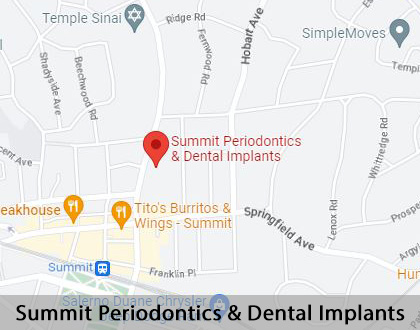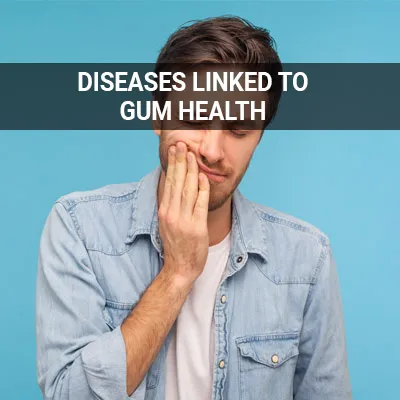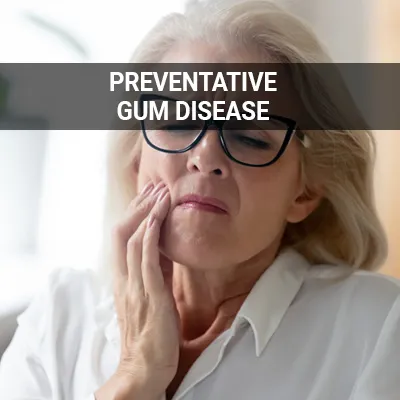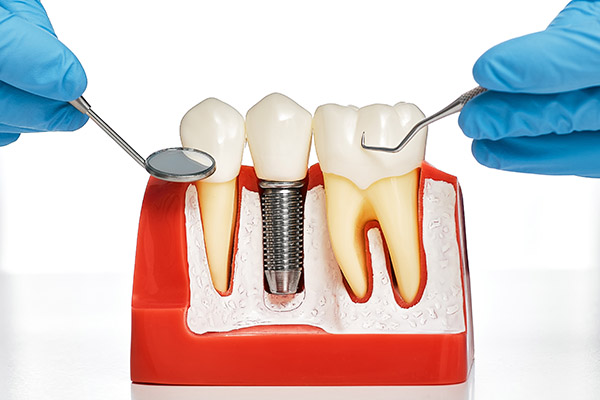Oral Pathology Summit, NJ
Oral pathology is a dental specialty that focuses on diseases in and around the mouth, jaw, and related oral structures. When a dentist or periodontist needs assistance in diagnosing and treating oral disease, they may enlist the help of an oral pathologist. Oral pathologists are involved in every area of disease management, including research, diagnosis, examination, and treatment.
Oral pathology covers a wide range of abnormalities of the mouth and jaw. The sooner a condition is diagnosed and treated, the better a patient's long-term outcome. Oral pathology is available at Summit Periodontics & Dental Implants in Summit and the surrounding area. Call us at (908) 219-6664 to schedule an appointment.
Oral Pathology Defined
Oral pathology is the study, diagnosis, and treatment of diseases involving teeth, gums, bones, and muscles around the mouth. That may include orofacial skin, which consists of the skin or mucous membranes of the face and oral cavity. Examples of oral abnormalities and diseases include cleft palate, misaligned jaw, gum disease, oral ulcers, and oral cancer.
Pathology of the dental and oral tissues has been around since dentistry's infancy. In 1946, a meeting helped determine whether it was feasible to create an organization dedicated to a new branch of dentistry called oral pathology. The response was positive, which established the American Academy of Oral Pathology.
“Oral pathology is the study, diagnosis, and treatment of diseases involving the teeth, gums, bones, skin, and muscles around your mouth.”
The Job of an Oral Pathologist
When a dental patient has a suspicious growth or symptoms that do not reveal an obvious diagnosis, it is essential to determine a cause. Some symptoms can indicate the presence of a more dangerous disease. A referral to an oral pathologist helps ensure an accurate diagnosis and timely treatment plan. Oral pathologists can conduct exams, review X-rays, and perform biopsies to diagnose conditions ranging from oral cancer and fungal infections to herpes of the mouth, and salivary problems. Based on the diagnosis, they curate an individualized treatment plan.
Oral pathologists often work together with general dentists, surgeons, and periodontists to make sure patients receive a precise diagnosis. Oral pathologists can simplify the treatment process and help make it as effective as possible. Since oral diseases can also be a sign of other serious health problems, an oral pathologist must have a broad understanding of both oral health and whole health.
“Oral pathologists often work together with general dentists, surgeons, and periodontists to make sure patients receive an accurate diagnosis.”
Oral Pathology and Periodontists
Oral pathologists and periodontists can diagnose mouth or jaw diseases. An oral pathologist focuses on the diagnosis and cause of a patient's particular oral health condition, specializing in complex or difficult cases. A periodontist is more treatment-based, completing deep cleanings that remove tartar and plaque from below the gum line, placing and maintaining dental implants, and performing surgical procedures.
Periodontists perform certain types of oral pathology. For example, if they spot areas of concern, a periodontist can conduct a soft tissue biopsy and send it to a lab to determine a cause. The results of the test will dictate the course of treatment. In comparison, an oral pathologist can do the biopsy and examine the tissue sample to make a diagnosis.
“A periodontist is more treatment-based, completing deep cleanings that remove tartar and plaque from below the gum line, placing and maintaining dental implants, and performing surgical procedures.”
Check out what others are saying about our dental services on Yelp: Oral Pathology in Summit, NJ
The Periodontist and Oral Conditions
Periodontists are highly trained surgeons who can address many more serious oral health conditions. That includes tooth extractions, bone and gum grafting, and dental implant placement. For example, patients with loose or missing teeth often have bone loss as well. A bone graft encourages regrowth of the jawbone and helps keep the teeth in place.
When the gums have receded to a dangerous level, a gum graft is necessary. That involves taking tissue from elsewhere in the mouth and using it to cover the receded gum line. This healthy gum line helps stop tooth decay, reduce pain and improve the patient's smile.
A periodontist is also a specialist in dental implants. Dental implants replace missing teeth and take the place of dentures or bridges. They attach to the bone beneath the gum tissue and restore form and function to the mouth.
“Periodontists are highly trained surgeons who can address many more serious oral health conditions.”
Questions Answered on This Page
Q. What is oral pathology? What is the history of oral pathology?
Q. What is the job of an oral pathologist?
Q. What type of serious oral conditions does a periodontist treat?
People Also Ask
Q. What are some possible complications of unhealthy gums?
Q. Can diseases of the body affect the gums?
Q. What is the difference between a dentist and a periodontist?
Q. What are common therapeutic treatments for gum disease?
Frequently Asked Questions
Q. What is oral pathology?
A. Oral pathology is the diagnosis, study, and treatment of oral diseases. Oral pathologists are involved in research, diagnosis, examination, and treatment. You may be referred to an oral pathologist to help determine the cause of your problem.
Q. What can an oral pathologist treat?
A. Oral pathologists treat oral conditions that relate to oral disease. They can treat various conditions including, but not limited to, oral cancer, salivary problems, canker sores, fungal infections, herpes of the mouth, and bad breath.
Q. What are some symptoms of dental disease?
A. Patients with a type of dental disease may experience swelling, dry mouth, oral infections, sores, bleeding gums, and pain while chewing. If you are having any of these symptoms, it is time for a dental appointment. The earlier dental disease gets diagnosed, the better your prognosis.
Q. What does a biopsy diagnose?
A. If the dentist sees potential signs of oral cancer, you will get referred to an oral pathologist. They will likely do an oral biopsy to help with the diagnosis. That involves removing a small part of the tissue in question and examining it under a microscope to see if the cells are cancerous.
Q. What are the most common oral diseases?
A. The most common oral diseases are tooth decay, gum disease, and oral cancer. In addition, poor oral health has gotten linked to other chronic conditions such as heart disease. Oral disease has also gotten linked to high-risk behaviors such as tobacco use and poor diet.
Start Feeling Better – Visit Us Today
By visiting us as soon as possible, our team can help get you the professional treatment you need. Instead of waiting around and allowing the symptoms to get worse, we can provide you with treatment options.
Definitions
Learn More About Oral Pathology
Oral pathology serves a vital role in the diagnosis and treatment of disease of the mouth. Scheduling regular checkups and cleanings will allow any anomalies to be caught earlier and treated before they get more serious. Call Summit Periodontics & Dental Implants at 908-219-6664 to schedule an appointment.
Helpful Related Links
- American Academy of Periodontology (AAP). American Academy of Periodontology (AAP). 2023
- Center for Disease Control and Prevention (CDC), Periodontal Disease Page. Center for Disease Control and Prevention (CDC), Periodontal Disease Page. 2023
- WebMD, What Is a Periodontist?. WebMD, What Is a Periodontist?. 2023
About our business and website security
- Summit Periodontics & Dental Implants was established in 2015.
- We accept the following payment methods: American Express, Cash, Check, Discover, MasterCard, and Visa
- We serve patients from the following counties: Union County, Morris County and Essex County
- We serve patients from the following cities: Summit, Chatham, New Providence, Springfield Township, Maplewood, Berkeley Heights, Madison, Westfield, Millburn and Short Hills
- Norton Safe Web. View Details
- Trend Micro Site Safety Center. View Details
Back to top of Oral Pathology










